
Hakuba/Happo is one of Japan's leading snow resorts, and the beauty of the Hakuba mountain range and its huge slopes make it a popular field that attracts skiers and snowboarders alike. In June 2020, Happo-One Development Co., Ltd., which operates 13 lifts and 4 facilities at Hakuba Happo-One Ski Resort, established the SDGs Marketing Department, the first in a ski resort in Japan. Now that efforts are spreading on a global scale, what is the background and mind behind starting the SDGs ahead of other Japanese snow resorts? What is the reality of SDGs initiatives?
In April 2022, when the mountains of the Hakuba Alps were still completely covered with snow, the staff of the STEEP editorial department visited Happo-One Development Co., Ltd. The head office is in front of the Happo-one ski resort bus terminal. Mr. Hideki Akimoto, General Manager of Sales and Administration Headquarters, welcomed us. He oversees the high-profile SDGs marketing department.
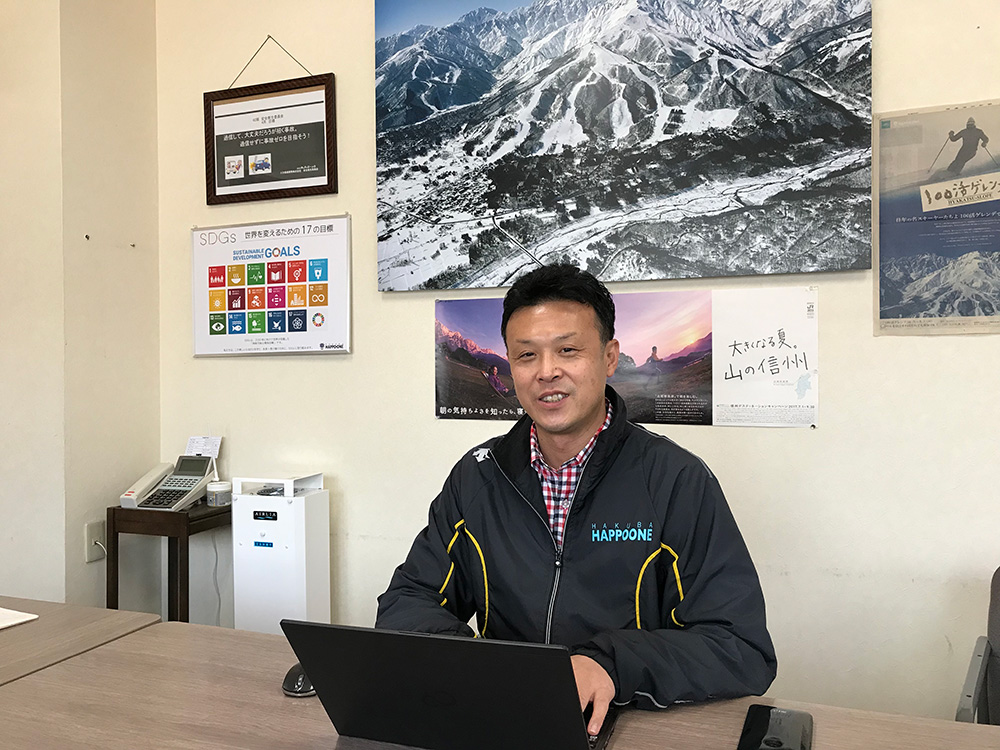
Background of SDGs initiatives
―Why did Happo-One Development decide to start working on the SDGs?
Did something happen? Mr. Akimoto: For the past few years, I've been feeling the light snow on my body, and I've experienced years when it doesn't snow in Hakuba. 2015-16 was a once-in-a-century snowfall, and the lack of snow continued until January 14th, making it impossible to ski all the way to the foot of the mountain. I said, "This is a once-in-a-century event! It's definitely not going to last two years," but the next season didn't snow until January 14th.
* We will proceed with presentation materials for SDGs initiatives.
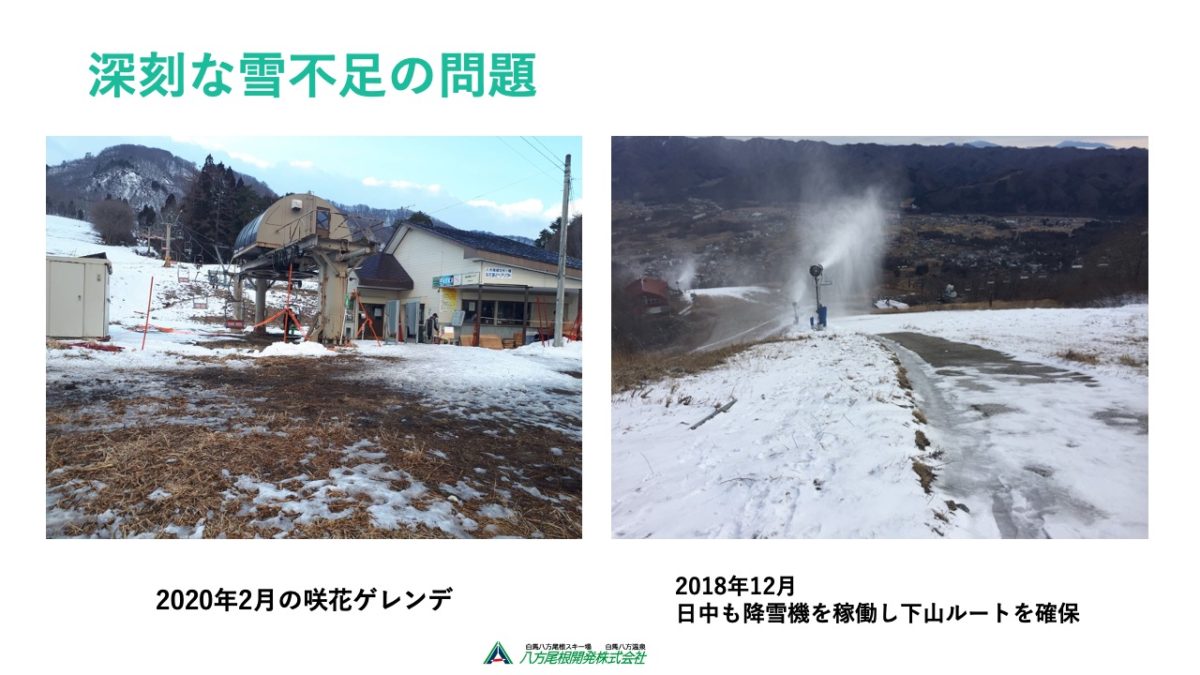
This is really unusual, but looking at the climate statistics over the past 100 years, the temperature is steadily rising, and the snow is getting less and less. . Snow walls are no longer forming all over town like they used to be, and in the last 10 years such a phenomenon has become a reality. The data on the average temperature and annual snowfall in Hakuba Village clearly shows that the average temperature in Hakuba Village has risen by about 1℃ over the past 30 years, and the annual snowfall has decreased by about 100cm. I'm here.
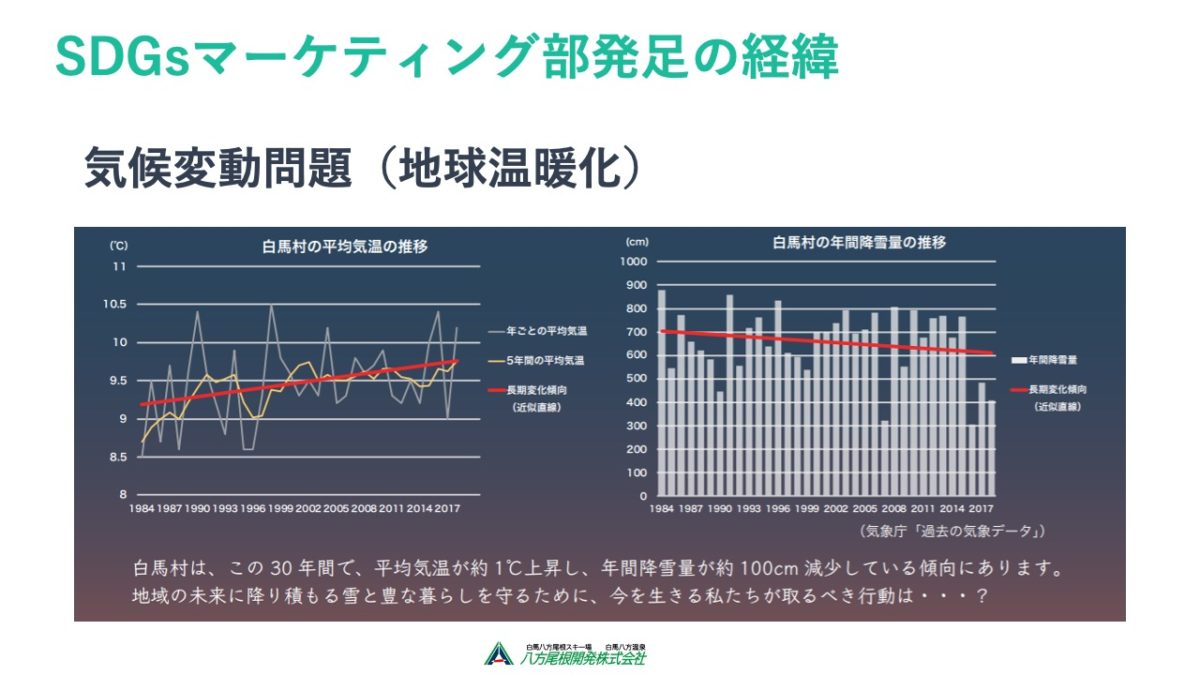
At that time, in March 2020, the representative of our company had the opportunity to meet Mr. Komatsu POW Japan I immediately took the steps to set up an SDGs department. I've been interested in climate change for some time, and I thought it was a problem that I would face as a company's responsibility in the future, so I decided to go with the flow. At that time, I thought that what was a sales department should start with the branding of Happo-one itself, instead of the conventional style of sales. So, in June 2020, we launched the SDGs Marketing Department.
Japan's first ski resort launches "SDGs Marketing Department"
―It was the first time for a ski resort in Japan to have an “SDGs Marketing Department,” right?
Mr. Akimoto: I thought about doing SDGs activities including digital marketing. Currently, Hakuba Happo-One Ski Resort has an online lift ticket sales system, and I thought of collecting customer information at the timing of sales and distributing the initiative to those users through a newsletter. Currently, the number of registered users exceeds 10,000, and it has been two years since we have been disseminating our SDGs initiatives.
The introduction of a digital system requires a certain amount of money, so it was difficult to start, but we were able to reduce the cost of introducing the equipment by using government subsidies. staff activity expenses can be raised. We were able to create a mechanism by building a structure that produces results one by one.
―What was the hardest thing in the early stages of the initiative?
Mr. Akimoto: First of all, it was difficult to gain understanding within the company. When we held something like an inaugural rally and asked, "Do you know what the SDGs are?", they answered, "What is that?" At that time, everyone didn't even know the word SDGs. However, over the past year, the media has suddenly picked up the word SDGs, and I think it has gained citizenship.
As an in-house initiative, first of all, what are the SDGs? POW gave us a lecture on this. Visualization is the key to permeation, so we posted SDGs panels in each department, put renewable energy stickers, sent out information through e-mail magazines, and conducted interviews about the environment.
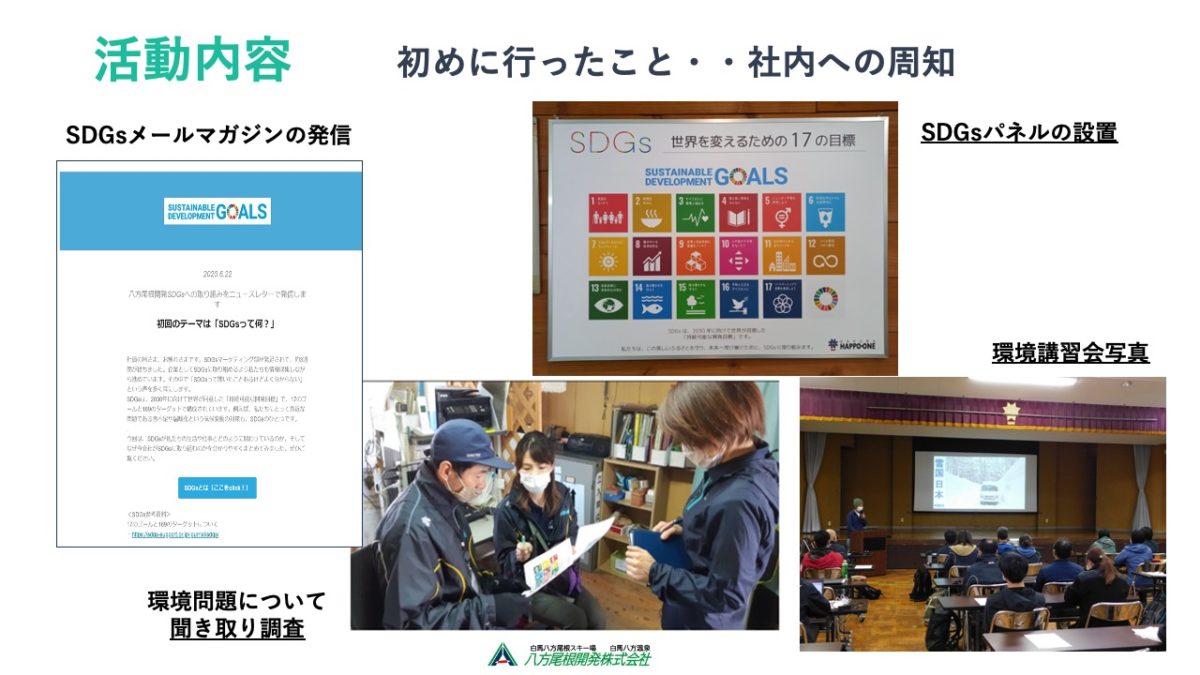
The first thing we considered as an environmental issue was what kind of power supply should be used. was. Since thermal power generation has a great impact on climate change, we thought that we should first switch from thermal power generation to other types of power.
Therefore, from the 2020-21 winter season, the power of the lift will be switched to renewable energy. In the first year, efforts to achieve the SDGs had not yet progressed nationwide, so we were able to switch while keeping electricity procurement costs down. Already the balance between supply and demand has changed, making it difficult to do so without increasing costs, and finally in April we were able to switch all lifts (13 operated by our company) to renewable energy.
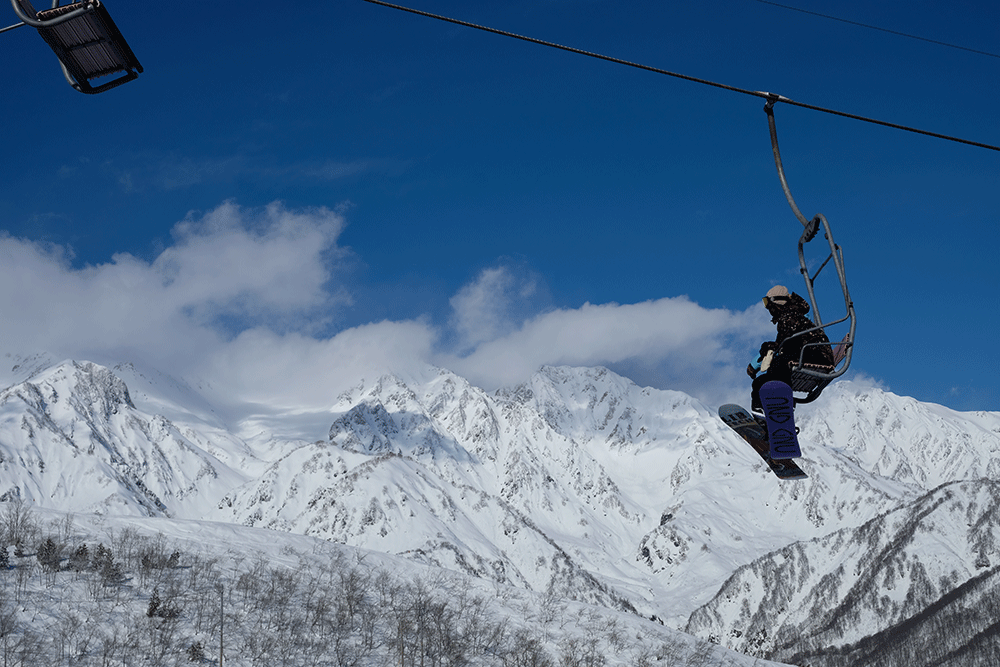
Achieved 100% renewable energy lift operation at exceptional speed
-That's amazing! Lift operation with 100% renewable energy!
Mr. Akimoto: It's only the part that our company operates in Hakuba Happo-One Ski Resort. The introduction of renewable energy in the first year was just one of the topics of the year, and there were many other topics such as the opening of new areas, the introduction of snow machines, online ticket sales, and reservation-only parking lots. I had the opportunity to make announcements on radio and television, and the biggest response from viewers was about renewable energy. I was a little surprised at how high the interest was, "Is it so amazing?" It was encouraging to hear many people say, "It is very meaningful for a large ski resort like Happo-one to take the lead in tackling renewable energy. I agree with you!" Thank you very much for your support.
―User evaluations and support are a great response and encouragement to your efforts, aren't they?
Mr. Akimoto: That's how much people are interested in the SDGs, and I felt that they have high expectations for Happo-one. Koyuki is a matter of life and death for ski resort management. If it doesn't snow, you have to make one, and that's where the snow machine comes in. There is a contradiction in that it uses a huge amount of energy to make snow, so to speak, "destroys the environment." switched to Electricity for pumping water for snowmaking is still ordinary electricity, so that is the next issue.
The snow compaction work on the slopes is also on a trial basis, but we are working to improve the efficiency of the work by linking a sensor that detects variations in artificial snowfall with a driving system to prevent unnecessary CO2 emissions.
Also, since we are in the hot spring business, we have switched to renewable energy in the same way, and more than 80% of the electricity used by the entire company, including the office, has been replaced with renewable energy. At this pace, I believe we will reach 100% by 2030.
―This very pioneering move, which was launched in 2019, has achieved an astonishing speed in achieving 100% renewable energy for Rift in just three years. What made it so fast?
Mr. Akimoto: I think the hardest thing is to get citizenship for the initiative. It is absolutely necessary to visualize what we are doing and to have a team that can be called a stakeholder or a team that can work together, both inside and outside the company.
In that sense, the ski resorts in the Hakuba area are integrated in the form of HAKUBA VALLEY, and a DMO called "HAKUBA VALLEY TOURISM" has been formed, and an organization called the SDGs subcommittee has been established there. We have been involved in this organization since its inception. The members also include government and local representatives, so they can share their activities and gain their understanding and support.
Also, it is true that the SDGs have been rapidly called out in the past year, and that has been a boost. We started using Slack as an information tool inside the company, and since we share information company-wide, it's natural for people to not be indifferent. Now, departments other than us can easily come up with ideas such as, "I'm thinking about something like this, but is it possible?" ?”, he throws out questions and opinions. When I first started up, no matter what I said, it was like "...???", which made me feel more reliable (laughs).
Even in individual departments, fixed costs are being reviewed, and I feel that SDGs chemicals are causing changes within the company. Communication within the company has also become active and open. I think this kind of environment is also very important for quickly making efforts. I feel like it's going very well now.
I feel like it's all going well now
―What is the current structure of the SDGs Marketing Department?
Ms. Akimoto: I oversee marketing as a whole, and the SDGs Marketing Department has three female staff. One of them is from Australia. Before the pandemic, 40% of our users were inbound, so responding to diversity is also an important theme.
Also, recently, not only renewable energy, but also efforts are spreading. I thought about environmental issues in a workshop format with local students, and made a large "snow sculpture of a whale" this winter. By creating an opportunity to feel once again that snow, which is always taken for granted, is not taken for granted, I wanted to give people a first-hand experience of the problem of light snow.
Originally, Happo-one has been involved in a vegetation restoration project to protect alpine plants in the summer, so the area is interested in nature conservation. We are also actively accepting school trips, and we have begun offering products that incorporate SDGs experiences together with the local community.
―I think there are concerns that SDGs initiatives are not directly linked to business and sales growth, and that they are rather costly. Was there any objection or resistance?
Mr. Akimoto: Due to my job, I have often visited overseas resorts for some time. So, 20 years have passed. Today, there is not a single resort in the United States that does not address environmental issues. As a result, we have the effect of becoming a so-called “loyal customer,” in which customers support the efforts of ski resorts and become established customers.
In addition, there is an advantage that there is a need to work at a company that is properly addressing environmental issues, and that it is possible to acquire highly conscious and high-quality human resources. Overseas, such a beneficial trend is certainly beginning to circulate.
Also, how can we fulfill social significance while doing business of skiing? I started to feel that I didn't get it. I started working on the SDGs with the idea that I should give back to society and the region from what I get from the blessings of nature such as mountains and snow.
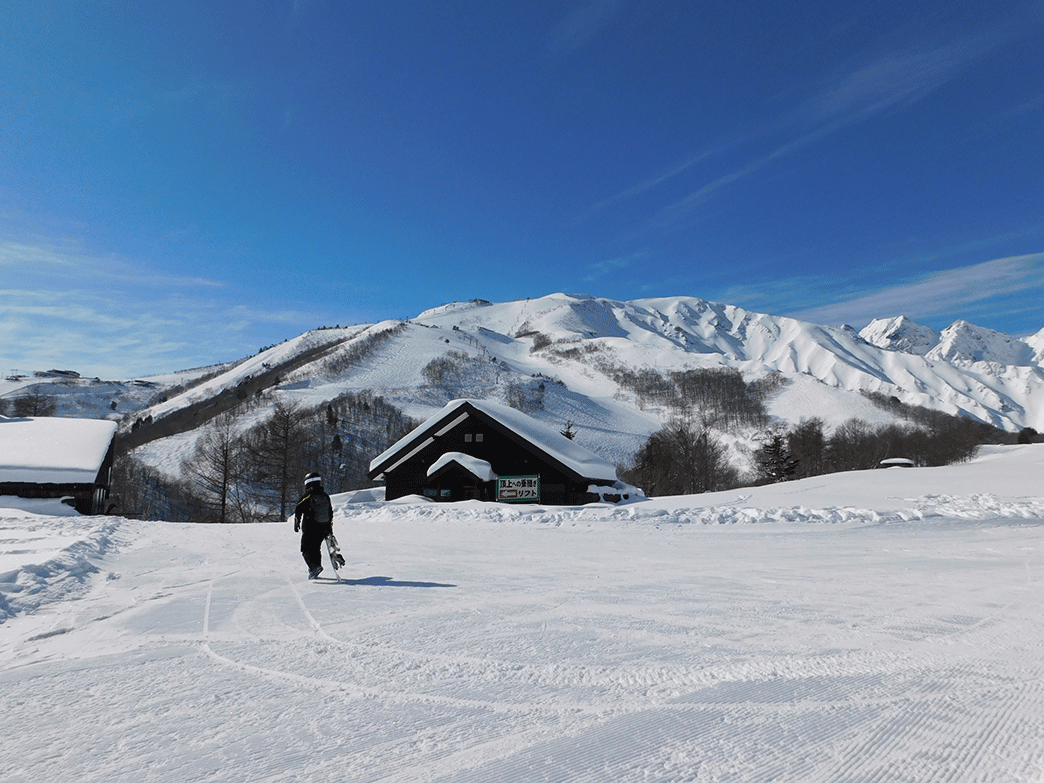
-Creating an environment where people who love snowy mountains and nature can work with pride.
Mr. Akimoto: Actually, in the first year, there was a young person who said, "Isn't there a department working on SDGs in partnership with POW? I want to work part-time!" He was highly skilled, had a strong sense of responsibility, and worked very hard. When we work on the SDGs, even in such a short period of time, people commit themselves to doing a good job. Furthermore, if people with disabilities can play an active role, diversity will take root.
Also, it will definitely increase your awareness of waste, so I think it will also have the advantage of being able to cut off the parts that were excessive. Our company has a history of about 60 years, but until now, most of our staff were from the local area. Right now, 20-30% are locals, and the rest are people who came from outside and have taken root in Hakuba. I think it is necessary to create a company where various people can commit in various ways.
What you can give back to users
―Is there anything that you can directly give back to your customers for your SDGs initiatives?
Akimoto: I think that's where our efforts and efforts are still lacking. Parking lot for example. In the United States, if one car rides together, it's more efficient, uses less gasoline, and reduces CO2 emissions.
But we still don't have a lot of variety in our initiatives, so it may not feel like we're directly connected to the benefit of our customers. If we talk about the details, we would like to reduce costs by preventing disposable chopsticks and promoting secondary use, such as not using disposable chopsticks in restaurants and collecting and reusing IC chips, and returning the accumulated savings. increase.
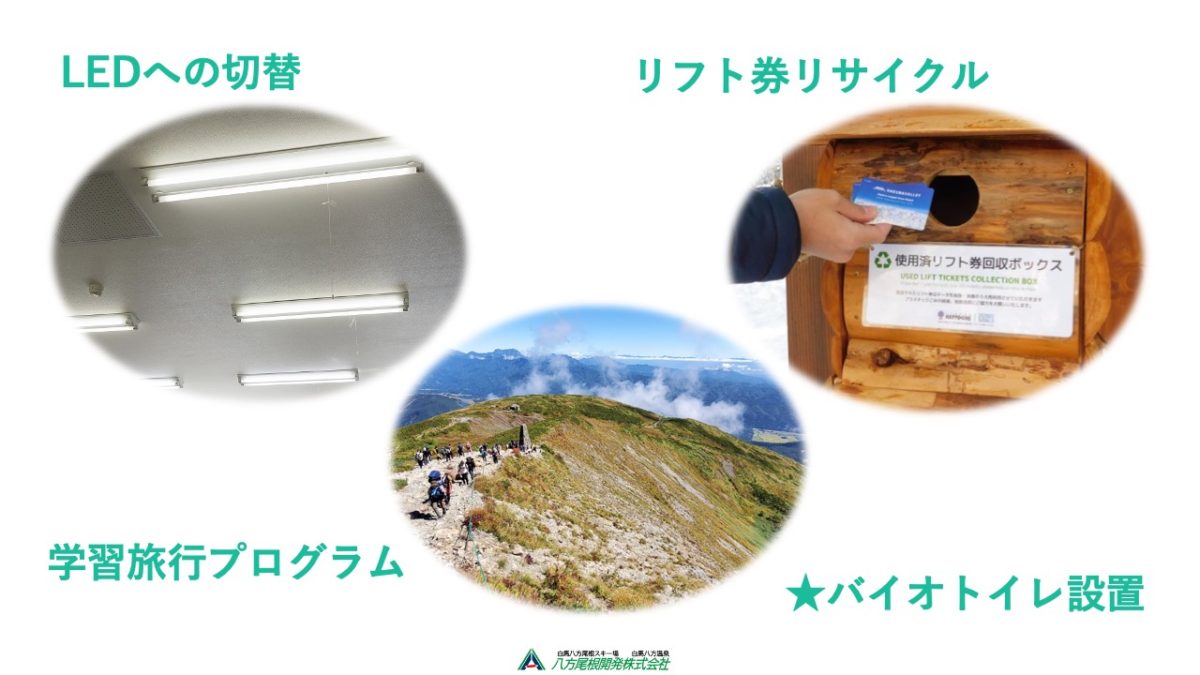
This year, we took on the challenge of building a biomass toilet, which is rare in cold climates. I think it is important to meet partners who are interested in such things and want to work together, and to actively work on what we can do now. In a sense, I think that by walking together with our customers, we can see the form of return as SDGs.

―Do you feel positive reactions from customers?
Akimoto: I still don't know if users think, "I want to go to Happo-one because Happo-one is doing that kind of initiative," but at least there are critical voices saying, "Why are you doing that?" I don't think so. If this is not done, there will surely be voices saying, "Why aren't you doing anything?"
―As long as the lift fee doesn't go up, won't there be complaints?
Mr. Akimoto: It's the opposite way of thinking, but if there is a program that can gain customers' sympathy from the viewpoint of protecting the natural environment, I feel that the combination of lift fee + additional fee will also lead to support. Dare to say, "Let's participate in SDGs The idea of making people feel the added value of their own contribution is a new initiative, so I would like to hear the voices of our customers through questionnaire surveys.
―It is said that 100% renewable energy will be achieved by 2030. How fast do you expect these initiatives to change in the snow industry?
Mr. Akimoto: I feel that the efforts of the entire ski industry are not keeping pace. Half of the ski resorts in Japan are privately owned and the other half are publicly owned. Considering the declining population problem in Japan, I think that if we don't create products for the upper class instead of products for the general public, we won't be able to survive. That's right. As a result, such movements will become more and more important, and the ski resorts that can focus on them will be limited to some extent.
Considering the differentiation and needs, ski resorts of a certain scale will take the initiative. Let's keep pace in the industry, realistically due to individual circumstances...
That said, ski resorts are artificially created by cutting down forests, so when you think about the nature of their livelihoods, I strongly feel that we have to actively protect the environment and contribute to society.
―Are you also working on other SDGs in addition to renewable energy?。
Mr. Akimoto: SDGs for quite some time, and in recent years, it has become very popular for auberge-style accommodations that offer hospitality with ingredients that are particular about Hakuba and Nagano Prefecture. Concentrated. Even the expensive type of 100,000 yen class is characterized by being sold out in no time.
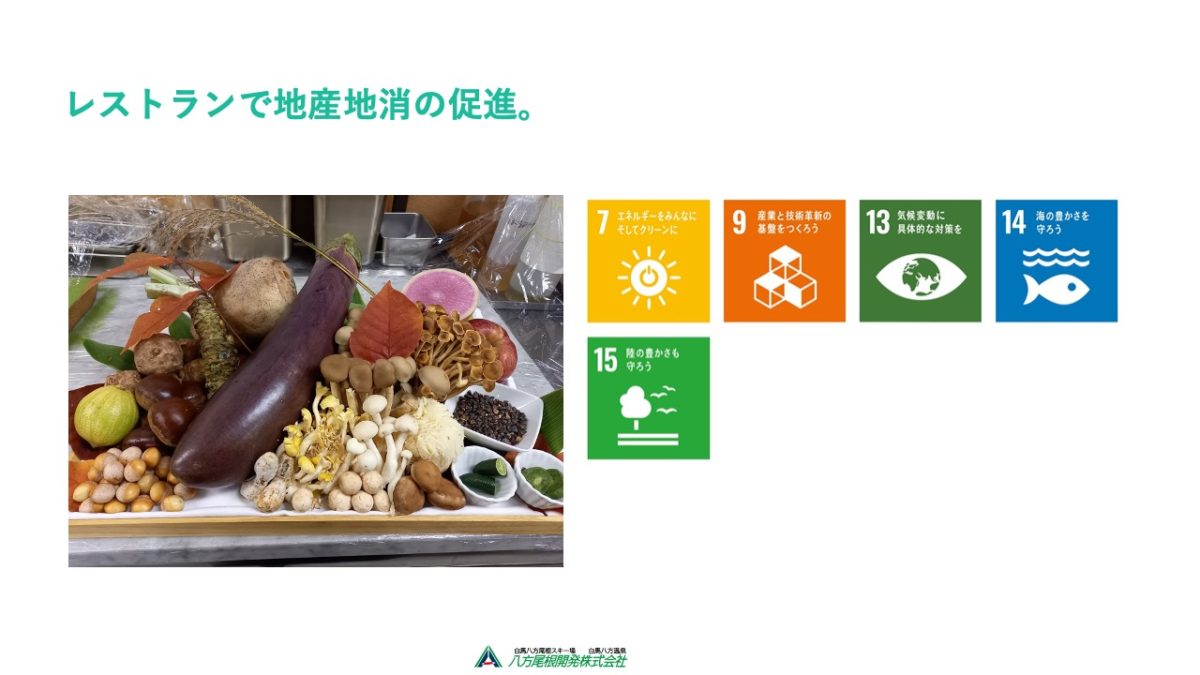
In addition, there are cases where gender issues such as LGBT should be considered. There are a certain number of LGBT people living in Hakuba. It's not a goal that can be achieved today or tomorrow, but the first step is to reach the ring, and I think that attitude is important.
Happo-One has many themes that allow you to work on SDGs all year round, such as the natural environment, snowy mountains, and alpine plants. I would like to work with the local people to create a sustainable and richer Hakuba so that we can do what we can do one by one.
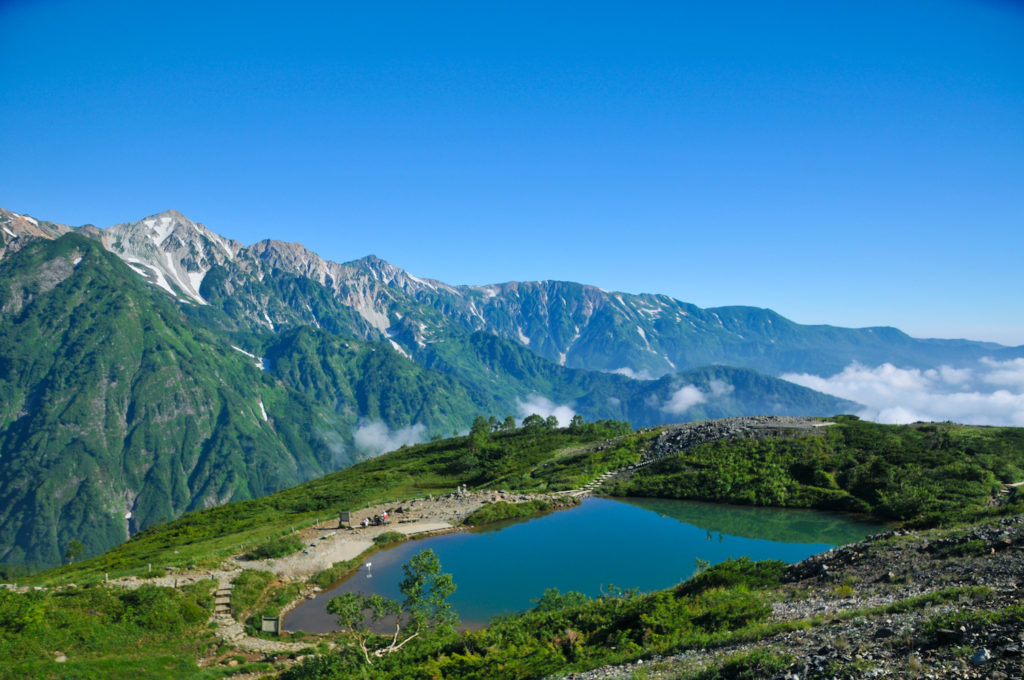
-I'm glad you worked on the SDGs! Are there any episodes that left a strong impression on you?
Mr. Akimoto: Since I was the first to start working on the SDGs, I started getting a lot of feedback from people around me. Not only POW Japan, but also new personal connections have spread, and communication has been born with industries and people that I had no contact with before. I am very happy about it, and I think it has great potential for the snow industry, which has been relatively 'closed' until now. Considering that this is also one of Goal 17 of the SDGs, “Partnerships for the goals,” I cannot help but feel that the SDGs are profound.
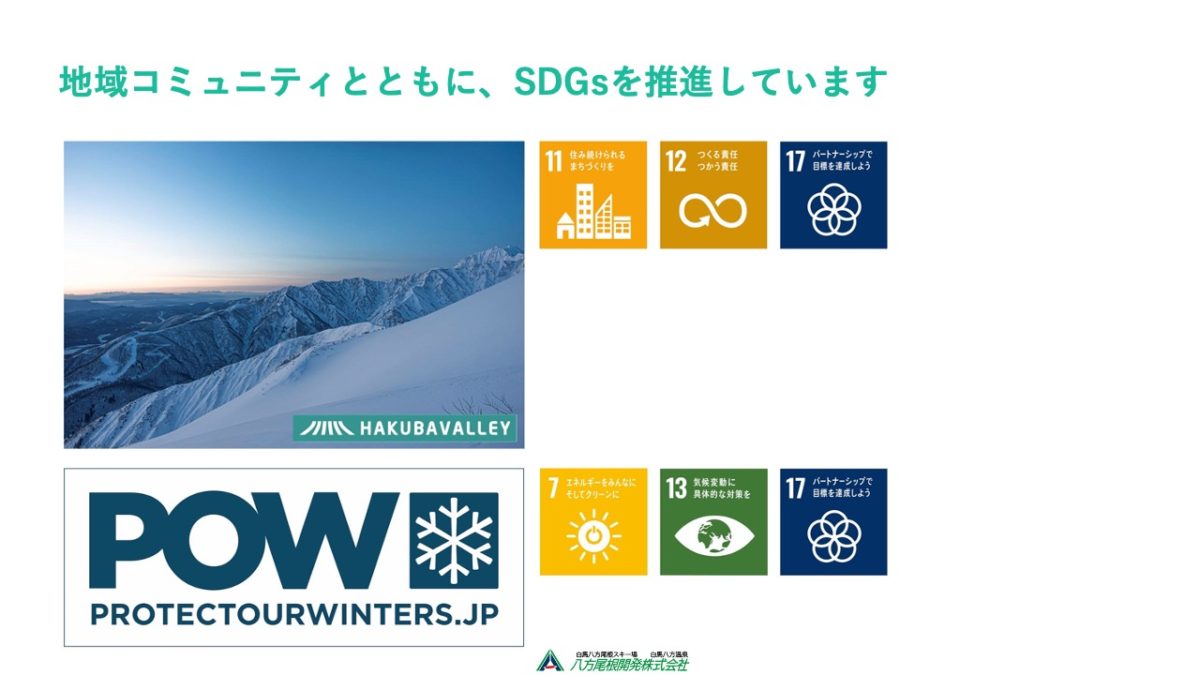
―Finally, do you have a message for skiers and snowboarders who think about the future of snow?
Mr. Akimoto: Problems with the natural environment cannot be solved by only specific regions or companies working on them. It's going to change by starting a little bit of what individual individuals can do now. Hakuba Happo-One Ski Resort will continue to work on environmental issues so that everyone can enjoy winter sports for a long time to come. Let's do our best together for sdgs!
the person who taught me
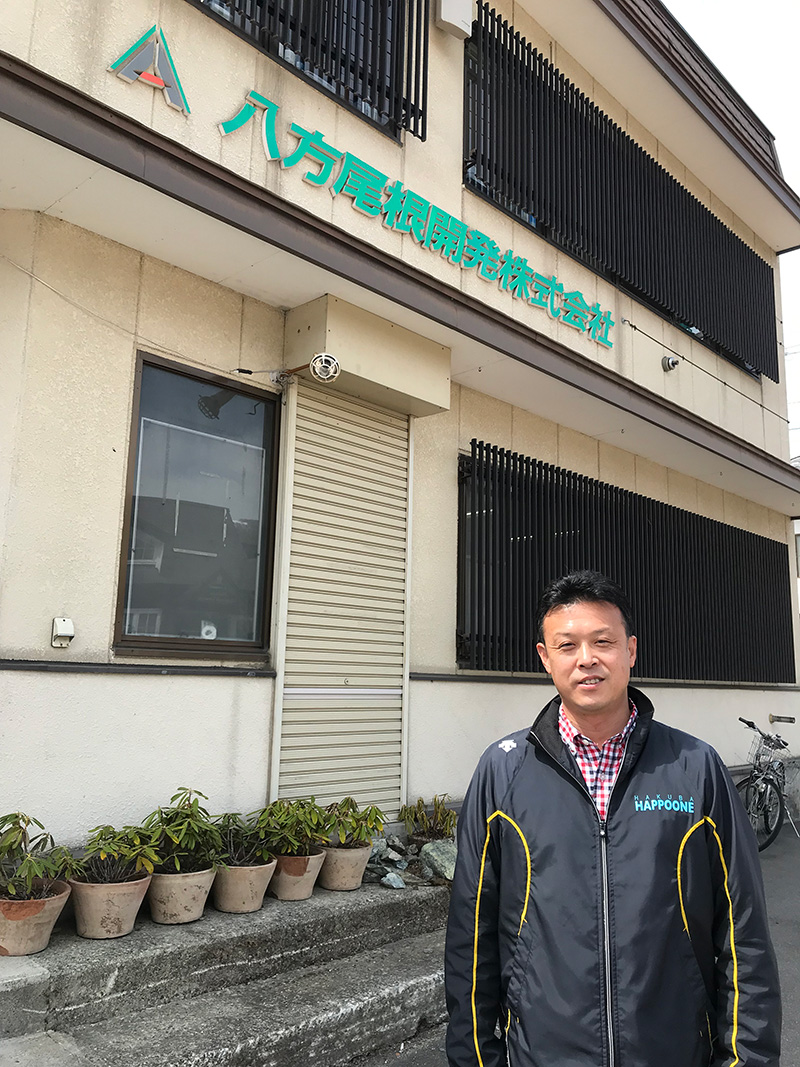
Akimoto
Hideki
Happo-One Development Co.
Executive Officer General Manager of Sales and Administration Headquarters
Born in Tokyo. After gaining experience in the restaurant business and trade, he has been involved in Hakuba since 1998.
Moved in 2005.
2015 Appointed General Manager of Sales Headquarters.
2016 Appointed Executive Officer Oversees the management and sales departments. Currently, he serves concurrently as vice chairman of the Happo-One Tourist Association and is working to revitalize the region.
Interview cooperation / Happoone Development Co. April 2022 Interview / STEEP Editorial Department

